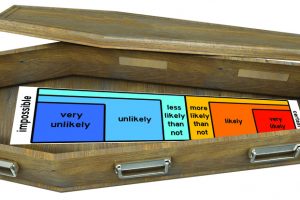By Bob Rietz
My father turned on his television one night 30 years ago and watched the fall of the Berlin Wall. I still remember his telephone call: “Bob, I can’t believe what’s happening! How can this be?”
Dad fought in New Guinea in World War II, and experienced the whole of the Cold War afterwards. He witnessed Chinese communists fighting American soldiers in Korea. The Russian communists were our enemies, enslaving most of Eastern Europe in the 1950s. The Berlin wall was built in 1961. Russia and America competed to achieve various firsts in the space race. He, like most Americans, saw the world in black and white—it was “us against them.”
He knew many brave Berliners tried escaping after the wall was built, some successfully, but some fell tragically short. His world, and the rest of the world, was changed forever on Nov. 9, 1989, when he witnessed live news coverage of that inconceivable event. His view of the world changed overnight to “us against who?” Other paradigms change more gradually.
Before 1900, most everyone knew that man was not meant to fly. Orville and Wilbur Wright believed differently, even as they experienced many failures over several years. Their first three flights on Dec. 17, 1903, covered less than 500 feet in total, hardly an auspicious beginning. What would Orville and Wilbur say about their 1903 vision if they laid eyes on a modern trans-Pacific airliner, with its luxurious business class accommodations?
Aviation took many lives during its infancy. Charles “Lucky” Lindbergh was the first person to fly nonstop across the Atlantic Ocean. Amelia Earhart, Buddy Holly, and the entire Marshall University football team weren’t so lucky. Flying was a dangerous enterprise for much of the 20th century.
I’m writing this as I fly from Asheville to Detroit to spend some time with my grandson. Flying is routine and it’s incomprehensibly safe. After all, the last U.S. commercial airline death was in 2018; the previous deaths were nine years earlier. The contemporary template for flying is, “Get on the aircraft, endure it, and get off the aircraft.” There’s no thought that a trip could end any differently.
Spaceflight, like aviation, had a troubled beginning. I remember watching several U.S. unmanned spacecrafts explode on the launchpad or shortly thereafter. The first few manned spaceflights were tentative—a few orbits and then safely back to earth. The general public thought the Mercury, Gemini, and Apollo programs were all safe, because they seemed to go off with only an occasional minor glitch.
But the Challenger and Columbia space shuttle disasters reminded everyone that spaceflight is a dangerous business. Both the American and Russian space programs experienced deaths of several astronauts while attempting to achieve new milestones. Almost 50 years after the last man walked on the moon (remember who?), manned launches to the International Space Station don’t even merit television coverage. Space tourism is close to becoming a reality. When did we start dismissing the dangers of spaceflight?
The moon was viewed as the final frontier for many years, but we are now standing on a similar threshold—Mars. Science fiction authors have long foretold colonizing Mars, but those stories were dismissed as mere flights of fancy. Today, the Spirit, Opportunity, and Curiosity rovers have transmitted breathtaking pictures of the Red Planet’s landscape. Hollywood has filmed several glamorous movies imagining successful manned missions to Mars.
There may well be fatalities before the first human steps foot on Mars, despite inconceivably complex engineering and intricate mathematical calculations. But man will walk on Mars—hopefully in my lifetime. Will I call my son and say, “Mike, I can’t believe what’s happening!”?
BOB RIETZ is a retired pension actuary who lives in Asheville, N.C.





